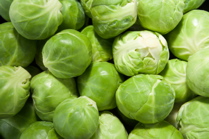Brussels Sprouts

The Brussels sprout is one of the cruciferous vegetables, which are known for their powerful cancer-fighting properties. Kale, broccoli, and cauliflower are also in this family.
Choose firm, compact, and vibrant green Brussels sprouts. Avoid wilted, yellowing leaves or leaves with perforations which can indicate an aphid infestation. Brussels sprouts are most commonly eaten boiled, but they retain most of their nutritional qualities when eaten raw or lightly steamed.
Individuals suffering from thyroid problems may want to avoid Brussels sprouts because they contain goitrogens, which can interfere with the functioning of the thyroid gland.
| Serving size: | 1 cup |
| Region: | Europe, California |
Health Benefits
| Colon | Reduce the risk of colon cancer. The fiber helps elimination and prevents diverticulosis. |
| Liver | Support the liver's detoxification role. Reduce the development of pre-cancerous cells in the liver. |
| Lungs | Reduce the risk of lung cancer. |
| Pancreas | Provide alkalizing elements that specifically benefit the pancreas. |
Nutrients
| Calcium | 37 mg | 3% | |
| Chlorophyll | N/A | N/A | Make sure to eat raw or very lightly steamed. |
| Fiber | 3.3 g | 13% | |
| Iron | 1.2 mg | 8% | |
| Manganese | 0.3 mg | 10% | |
| Potassium | 342 mg | 10% | |
| Sulfur | N/A | N/A | |
| Vitamin B6 | 0.2 mg | 11% | |
| Vitamin B9/Folate | 53.7 mcg | 27% | |
| Vitamin C | 74.8 mg | 125% | |
| Vitamin K | 156 mcg | 195% | |
| Zinc | 0.4 mg | 3% |
